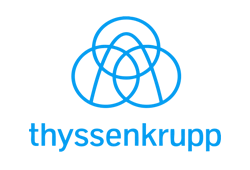Quick profile
thyssenkrupp is a corporate group of largely independent industrial and technology businesses operating internationally with over 100,000 employees between them. Under the umbrella brand of thyssenkrupp, with innovative products, technologies and services the group creates long-term values, and contributes towards a better life for future generations.
Activities in the real-world laboratory
Dealing with limited resources and energy is a global challenge, in regard to which thyssenkrupp is continually working on solutions. A key technology for the integration of renewable sources of energy is water electrolysis. Based on leading electrolysis technologies worldwide, experts from thyssenkrupp nucera have developed a solution which makes the large-scale production of hydrogen from electricity economically attractive. Hydrogen is not only a clean source of energy, whether it be for long-term storage of energy in the gas grid or for clean fuels. If it is produced with the aid of renewable energy sources, it can also be used for sustainable production of important basic chemicals. Moreover, together with the project partners, thyssenkrupp Uhde, the chemical plant engineering specialist of thyssenkrupp, will formulate a concept study for the production of methyl alcohol from carbon dioxide emissions of cement works and hydrogen from the electrolysis. The basis for this is a method developed by thyssenkrupp Uhde for producing methyl alcohol, which only needs carbon dioxide as a carbon carrier. In order to make carbon dioxide (CO2) from the cement production process useful for this purpose, thyssenkrupp Polysius will provide the oxyfuel process for a more efficient firing process, in which highly concentrated CO2 is generated.
“In the WESTKÜSTE100 project, we show that technology as well as integration competencies are necessary to protect the climate.”
Long-term vision
The water electrolysis of thyssenkrupp nucera can, as a starting point for various sustainable value creation chains, contribute towards gradually making the present-day, carbon-based industry more environmentally friendly. Green hydrogen, as a clean, CO2-free raw material, has a wide range of uses: for storing energy, in mobility, and also for the production of sustainable chemicals, such as methyl alcohol as a raw material for numerous further products. If the industrially-caused CO2 is used as a raw material for this purpose, this is a further important contribution towards decarbonisation.

